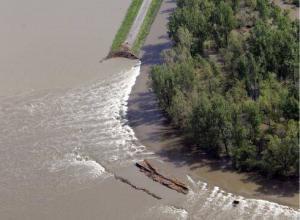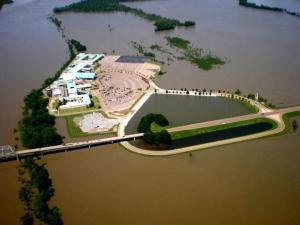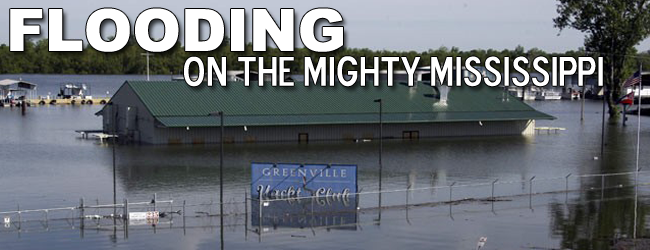
Many are aware of the flooding that has plagued hundreds of miles of farms, towns, and homes close to the mighty Mississippi River. Missouri, Mississippi, Illinois, Tennessee, Louisiana and Arkansas have all experienced high waters and flooding. USA Today reports, “The sliver of land in northwest Mississippi, home to hardship and bluesman Muddy Waters, is in the crosshairs of the slowly surging river, just like many other areas along the banks of the big river.” There are many reports that the flooding is exceeding the high water records that have stood since the 1930s.
A number of areas that are well-known, if only as lines in songs, to roots and blues music enthusiasts are under water; Rolling Fork, Friar’s Point, Greenville, Rosedale, and many others are experiencing what is either threatening to be, or already is, unprecedented flooding.
The Mississippi Delta, a stretch of land along the Mississippi River that starts at the upper west corner of Mississippi and extends roughly 250 miles, is exceptionally prone to flooding. The land is famously flat and fertile; both are a result of countless hundreds of years of floods that deposited rich minerals from the rivers and flattened the land. The first levees were built over 100 years ago to make the area habitable and to protect the area’s valuable cotton crop and it’s residents, but even the mightiest levee is susceptible to collapse under the Mississippi’s legendary swelling.
Delta bluesmen have been singing about floods and levee breaches since before music was recorded. Memphis Minnie, Son House, Muddy Waters, and Bessie Smith have all addressed the topic in song. Charley Patton recorded “High Water Everywhere” in reference to the flood of 1927, the worst in American history until the flood of 1993. The lyrics are especially poignant today:
Look-a here the water now, Lordy,
Levee broke, rose most everywhere
The water at Greenville and Leland,
Lord, it done rose everywhere
Boy, you can’t never stay here
I would go down to Rosedale,
but, they tell me there’s water there
The Leland Blues Project was recently forced cancel the 12th annual Highway 61 Blues Festival in Leland, Mississippi, due to the unprecedented threat of a levee breach. Parts of Greenville are already submerged. “We couldn’t in good conscience go ahead with the festival,” say Leland’s Randy Magee, “bringing people into an area with the potential for disaster. The water may receed by June 4, but we will be busy trying to help our families and friends reclaim their lives after this epic event.”
In 1973, the river near Leland reached 58 feet, and the south delta was flooded from Rolling Fork to Vicksburg, some fifty miles. This year, the crest is predicted at 64.5 feet, and threatens to raise higher if more rainfall comes, and areas from Cape Girardeau, Missouri to Greenville are already flooded. The Army Corps of Engineers recently performed a controversial controlled demolition of a levee in New Madrid county, Missouri to save a nearby Illinois town. The blow flooded over 200 square miles of Missouri farmland, and will provide little-to-no relief in Mississippi, as the flood water will find it’s way back into tributaries and, eventually, back into the “Big Muddy”, as the Mississippi is called.
Currently, the levees are largely holding, but the longer the water stays, the more levees become saturated and weakened, and the higher the water rises, the more strain is put on the Levees. There were reports of basements flooding in Helena, Arkansas, home to the famous King Biscuit Festival, from ground saturation. Helena’s mighty levee that holds back the Mississippi, though, which countless King Biscuit festival goers have perched across to hear blues for thirty years, is holding — for now.



